As the horrors in Gaza worsened, U.S. Congress applauded Netanyahu for demanding more arms. In contrast, Beijing hosted Palestinian factions, pushing for unity and peace.
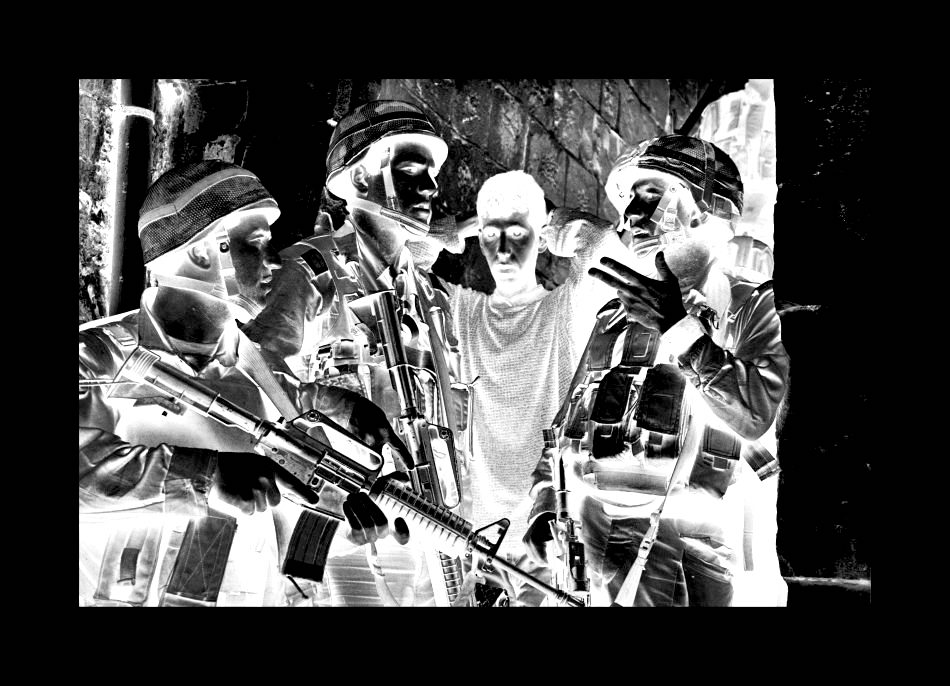
Rula Halawani, Palestine, “Untitled XII” from the Negative Incursion series, 2002.
By Vijay Prashad
Tricontinental: Institute for Social Research
 Senior United Nations officials briefed the U.N. Security Council on July 26 about the terrible situation in Gaza. “More than 2 million people in Gaza remain trapped in an endless nightmare of death and destruction on a staggering scale,” said Deputy Commissioner-General Antonia De Meo of the U.N. Relief and Works Agency for Palestine Refugees (UNRWA).
Senior United Nations officials briefed the U.N. Security Council on July 26 about the terrible situation in Gaza. “More than 2 million people in Gaza remain trapped in an endless nightmare of death and destruction on a staggering scale,” said Deputy Commissioner-General Antonia De Meo of the U.N. Relief and Works Agency for Palestine Refugees (UNRWA).
Within Gaza, the U.N. officials wrote, 625,000 children are trapped, “their futures at risk.” The World Health Organisation has recorded “outbreaks of hepatitis A and myriad other preventable diseases” and warns that it is “just a matter of time” before a polio outbreak spreads amongst children.
In early July, a letter in The Lancet from three scientists working in Canada, Palestine and the United Kingdom suggested that if they applied a “conservative estimate of four indirect deaths per one direct death to the 37,396 deaths reported, it is not implausible to estimate that up to 186,000 or even more deaths could be attributable to the current conflict in Gaza.”
Two days before the U.N. Security Council meeting, on July 24, Israeli Prime Minister Benjamin Netanyahu addressed both chambers of the U.S. Congress.
Two months before this appearance, the International Criminal Court (ICC) said it had “reasonable grounds to believe” that Netanyahu bears “criminal responsibility for… war crimes and crimes against humanity.”
This judgment was utterly set aside by elected U.S. representatives, who welcomed Netanyahu as if he were a conquering hero. Netanyahu’s language was chilling: “Give us the tools faster, and we’ll finish the job faster.”
What is the “job” that Netanyahu wants the Israeli military to finish?
In January, the International Court of Justice reported a “plausible claim of genocidal acts” by the Israeli army. So, is the “job” that Israel wants to complete its genocide of the Palestinian people, accelerated by the increased provision of arms and funding by the U.S.?
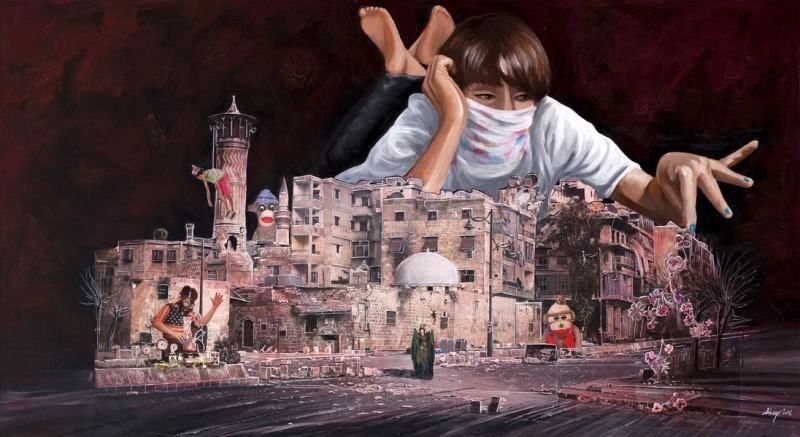
Shurooq Amin, Kuwait, “The Moving Dollhouse,” 2016.
Despite Netanyahu’s complaint that the U.S. has not been sending sufficient weapons, in April the U.S. government approved the sale of 50 F-15 bombers to Israel, worth $18 billion, and in early July said it would send nearly 2,000 500-pound bombs to be used in Gaza.
Netanyahu wanted more then, and he wants more now. He wants to “finish the job.” This genocidal language is sanctified by the U.S. government, whose representatives accompanied the call for mass murder with a standing ovation.
Outside the halls of government, tens of thousands of people protested Netanyahu’s visit to Congress. They are part of the phalanx of young people who have been involved in a cycle of protests against the Israeli genocide of Palestinians and against the U.S. government’s total support of the violence.
Netanyahu called the protestors “Iran’s useful idiots,” a strange statement made by a foreign guest of the citizens who were exercising their democratic rights in their own country. The police used pepper spray and other forms of violence to contain the protests, which were peaceful and righteous.
While Washington welcomed the accused war criminal, Beijing hosted representatives of 14 Palestinian factions who came to discuss their differences and find a way to build political unity against the Israeli genocide and colonisation.
Just before Netanyahu entered the congressional chamber, the 14 representatives posed for a photograph at the Diaoyutai State Guesthouse in Beijing. Their agreement, the Beijing Declaration, advanced their commitment to work together against the genocide and the occupation and recognised that their disunity has only helped Israel.
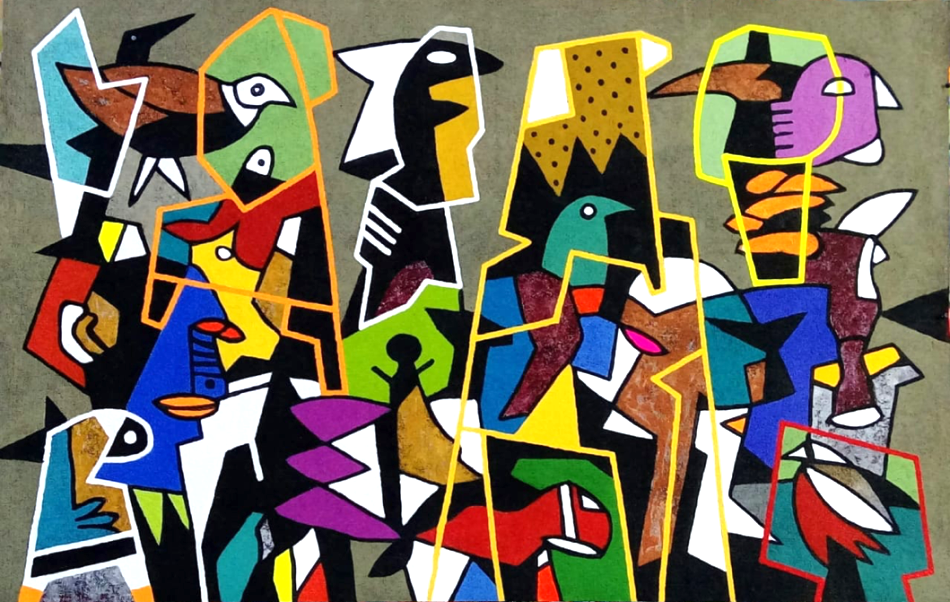
Charles Khoury, Lebanon, “Untitled,” 2020.
When the Soviet Union collapsed in 1991, a range of national liberation movements, such as those in South Africa and Palestine, were enfeebled and forced to make significant concessions in order to end conflicts with their colonisers.
After several false starts, the apartheid regime in South Africa joined the Multi-Party Negotiating Forum in April 1993, which was the site of concessions made by the liberation forces (undermined by the assassination of communist leader Chris Hani that same month and by attacks from the neo-Nazi Afrikaner Weerstandsbeweging).
The negotiated transfer of power through the interim constitution of November 1993 did not dismantle structures of white power in South Africa.
Meanwhile, in 1993 and 1995, the Palestinian Liberation Organisation (PLO) agreed to the Oslo Accords, in which the PLO recognised the state of Israel and agreed to build a state of Palestine in East Jerusalem, Gaza and the West Bank.
Edward Said called the Oslo Accords a “Palestinian Versailles,” a judgment that seemed harsh at the time but which, in retrospect, is accurate.
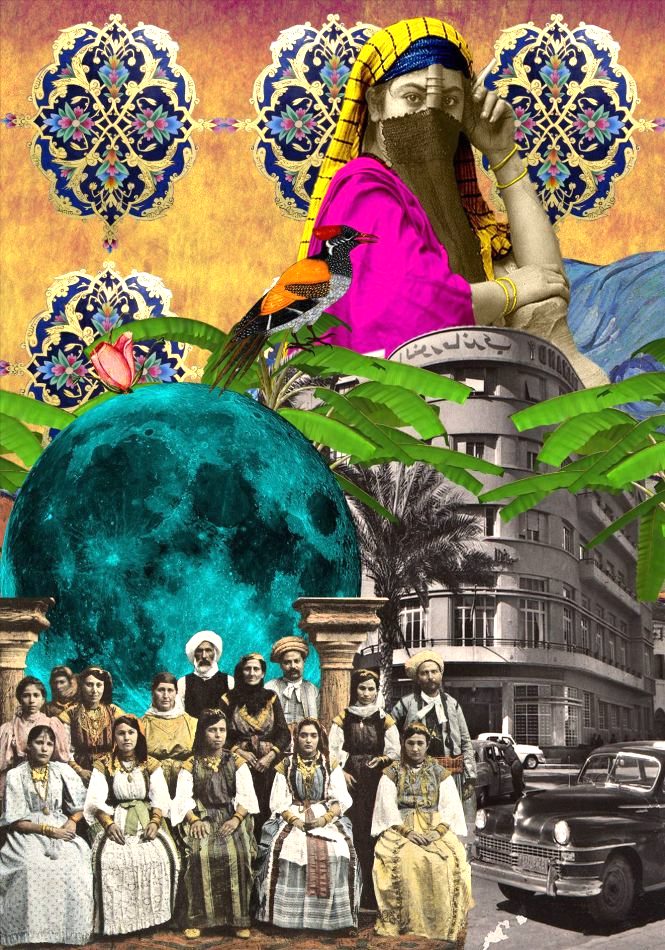
Zaina El Said, Jordan, Ersin, 2017.
Israel used the Oslo Accords to press its advantage, mainly by building illegal settlements across Palestinian land and by denying Palestinians the right to free passage through the three non-contiguous territories.
In 1994, leading groups in the PLO created the Palestinian National Authority to bring the factions together in the new state project, but the groups that had rejected the Oslo Accords did not want to manage the occupation on Israel’s behalf.
In January 2006, Hamas won the largest bloc in the Palestinian legislative elections, with 74 out of the 132 seats, and by June 2007 Fatah and Hamas broke relations and ended the attempt to build a new, post-Oslo Palestinian national project.
In May 2006, from within Israel’s harsh prisons, five Palestinians who represented the five main factions drafted the Prisoners’ Document: Abdel Khaleq al-Natsh of Hamas, Abdel Raheem Malluh of the Popular Front for the Liberation of Palestine, Bassam al-Saadi of the Islamic Jihad, Marwan Barghouti of Fatah and Mustafa Badarneh of the Democratic Front for the Liberation of Palestine.
These five factions include two left formations, two Islamist formations and the main national liberation platform. The 18-point document called upon various groups — including Hamas and Islamic Jihad — to reactivate the PLO as their joint platform, accept the Palestinian Authority as the “nucleus of the future state” and retain the right to resist the occupation.
In June, all parties signed a second draft of the document. Despite attempts to create unity, including during the Israeli assault on Gaza known as Operation Summer Rains, from June to November 2006, no such convergence was possible. The animosity among the Palestinian factions remained.
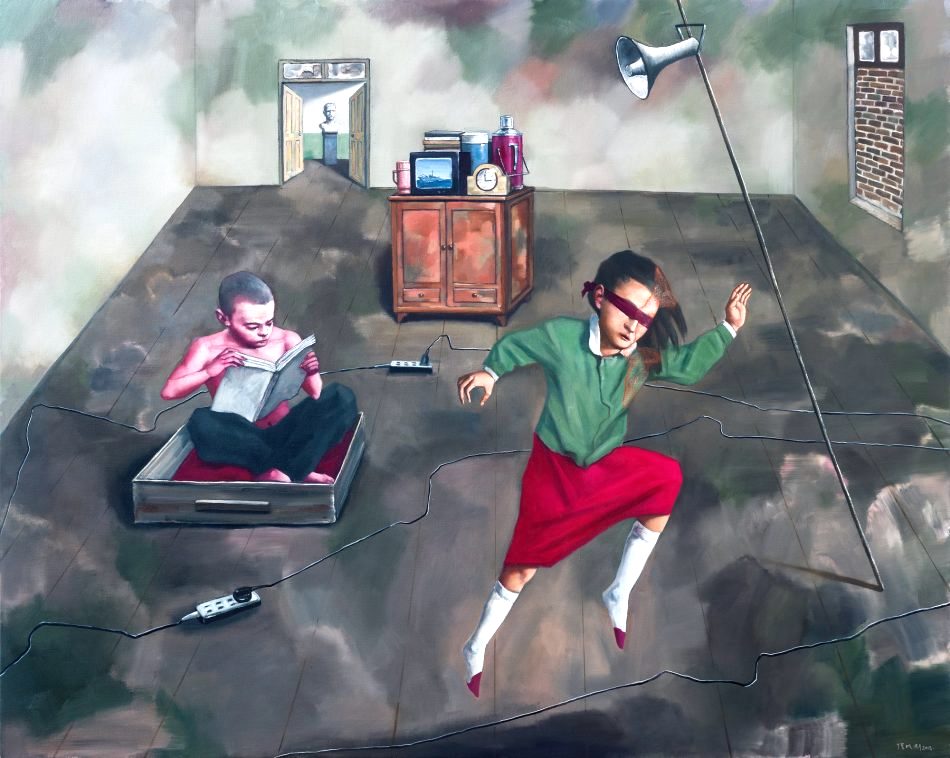
Zhang Xiaogang, China, “Blindfolded Dancer,” 2016.
This disunity has provided ample space for the Israeli occupation to deepen and for Palestinians to flounder without a central political project. Several attempts to bring Palestinian political groups into a serious dialogue have failed to provide any forward motion, including in Cairo in May 2011 and October 2017 and in Algiers in October 2022.
Since last year, the Chinese government has worked with various regional states to invite the 14 main Palestinian factions to Beijing for reconciliation talks. These factions are:
1. Arab Liberation Front
2. As-Sa’iqa
3. Democratic Front for the Liberation of Palestine
4. Fatah
5. Hamas
6. Islamic Jihad Movement
7. Palestinian Arab Front
8. Palestinian Democratic Union
9. Palestinian Liberation Front
10. Palestinian National Initiative
11. Palestinian People’s Party
12. Palestinian Popular Struggle Front
13. Popular Front for the Liberation of Palestine
14. Popular Front for the Liberation of Palestine (General Command)
The Beijing Declaration, repeating the formulations in the Prisoners’ Document, called for a Palestinian state to be established, for Palestinians’ right to resist the occupation to be respected, for Palestinian political groups to form an “interim national consensus government” and for the PLO and its institutions to be strengthened in order to advance their role in the struggle against Israel.
Though the declaration of course called for an immediate ceasefire and an end to settlement construction in East Jerusalem and the West Bank, its main focus was on political unity.
Whether this Chinese-brokered process will yield results when Palestinians sit down with Israelis is to be seen. Yet it nonetheless marks an advance in this direction and a possible turning point in the collapse of a unified Palestinian project that began in the wake of the 1995 Oslo II agreement.
The Beijing Declaration is diametrically opposed to the vehemence of Netanyahu’s speech in the U.S. Congress: the latter genocidal and dangerous, the former seeks peace in a complex world.
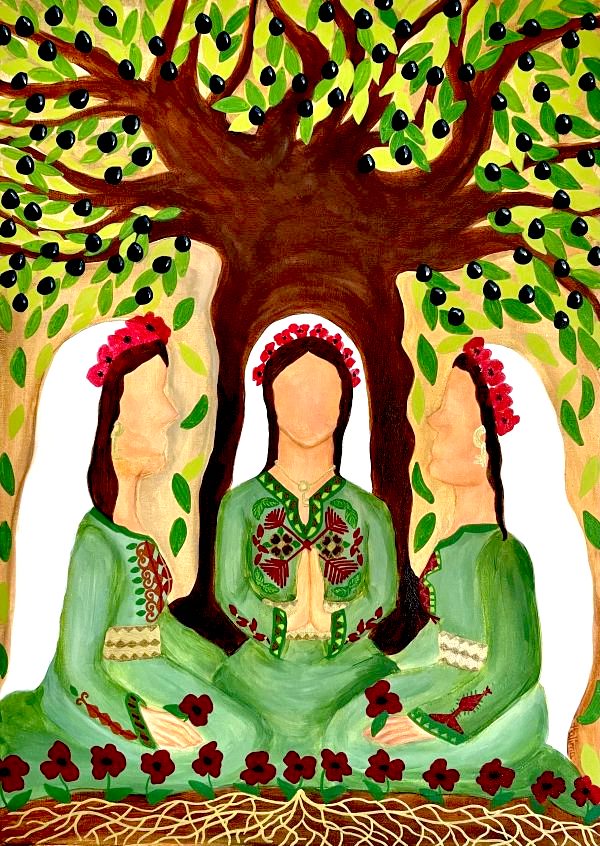
Halima Aziz, Palestine, “Praying Palestinian Women,” 2023.
Fadwa Tuqan (1917–2003), one of Palestine’s most wondrous poets, wrote “The Deluge and the Tree.” The fall of the tree, beaten down by the deluge, was not its end but a new beginning.
When the Tree rises up, the branches
shall flourish green and fresh in the sun,
the laughter of the Tree shall blossom
beneath the sun
and birds shall return.
Undoubtedly, the birds shall return.
The birds shall return.
The assassination of Hamas leader Ismail Haniyeh (1962–2024) in Tehran has made the situation deeply difficult, and will make it difficult for the birds to sing.
Vijay Prashad is an Indian historian, editor and journalist. He is a writing fellow and chief correspondent at Globetrotter. He is an editor of LeftWord Books and the director of Tricontinental: Institute for Social Research. He is a senior non-resident fellow at Chongyang Institute for Financial Studies, Renmin University of China. He has written more than 20 books, including The Darker Nations and The Poorer Nations. His latest books are Struggle Makes Us Human: Learning from Movements for Socialism and, with Noam Chomsky, The Withdrawal: Iraq, Libya, Afghanistan and the Fragility of U.S. Power.
This article is from Tricontinental: Institute for Social Research.
Views expressed in this article may or may not reflect those of Consortium News.

Our so-called “democratically elected officials”, the representatives of the long regarded “free world”, are taking the side of absolute evil. The authoritarian Communist Chinese government is on the side of trying to do some real good, trying to bring about peace.
Very good statement, I wholly agree. One of the most nauseating things I have ever seen is the lackey Congress, AIPAC, funded, who wildly applauded the genocidal war criminal, Benjamin Netanyahu. I am 80 years old and spent many years teaching U.S. History at a California state university. I think you would have to go back to the Southern slave owners an their representatives in Congress to see anything comparable. And at least those Congresses had some abolitionists like Charles Sumner. There were people like Bernie Sanders and a number of other senators and congress members who boycotted Netanyahu. But Rashida Tlaib, the only Palestinian Congress member was a lot more courageous in attending the Congress and holding up a sign alluding to his genocide. I think if I see any more fawning over Netanyahu, I will surely vomit.